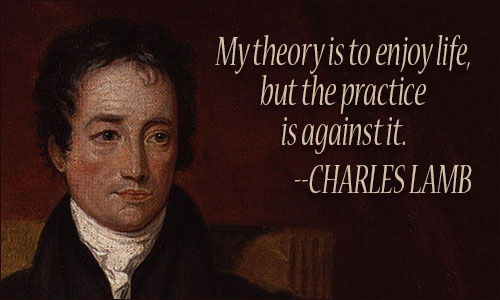CHARLES LAMB QUOTES II
English essayist and critic (1775-1834)

Notice: Undefined variable: id in /hermes/walnacweb03/walnacweb03ak/b2149/pow.notablequote/htdocs/l/includes/quoter.php on line 25
It is well if the good man himself does not feel his devotions a little clouded, those foggy sensuous steams mingling with and polluting the pure altar surface.
CHARLES LAMB
Notice: Undefined variable: id in /hermes/walnacweb03/walnacweb03ak/b2149/pow.notablequote/htdocs/l/includes/quoter.php on line 35
"Grace Before Meat", Elia
Notice: Undefined variable: id in /hermes/walnacweb03/walnacweb03ak/b2149/pow.notablequote/htdocs/l/includes/quoter.php on line 61
The going away of friends does not make the remainder more precious. It takes so much from them as there was a common link. A. B. and C. make a party. A. dies. B. not only loses A. but all A.'s part in C. C. loses A.'s part in B., and so the alphabet sickens by subtraction of interchangeables.
CHARLES LAMB
letter to William Wordsworth, Mar. 20, 1822
I know that a sweet child is the sweetest thing in nature, not even excepting the delicate creatures which bear them.
CHARLES LAMB
"A Bachelor's Complaint", Elia and the Last Essays of Elia
The human species, according to the best theory I can form of it, is composed of two distinct races, the men who borrow, and the men who lend.
CHARLES LAMB
"The Two Races of Men", Essays of Elia
A pun is a pistol let off at the ear; not a feather to tickle the intellect.
CHARLES LAMB
"Popular Fallacies", Last Essays of Elia
My theory is to enjoy life, but the practice is against it.
CHARLES LAMB
letter to William Wordsworth, Mar. 20, 1822
Dream not ... of having tasted all the grandeur and wildness of fancy till you have gone mad!
CHARLES LAMB
letter to Samuel Taylor Coleridge, Jun. 10, 1796
I can scarce bring myself to believe, that I am admitted to a familiar correspondence, and all the license of friendship, with a man who writes blank verse like Milton.
CHARLES LAMB
letter to Samuel Taylor Coleridge, Feb. 13, 1797
I grow ominously tired of official confinement. Thirty years have I served the Philistines, and my neck is not subdued to the yoke. You don't know how wearisome it is to breathe the air of four pent walls without relief day after day, all the golden hours of the day between ten and four without ease or interposition ... these pestilential clerk-faces always in one's dish. O for a few years between the grave and the desk!
CHARLES LAMB
letter to William Wordsworth, Mar. 20, 1822
For God's sake (I never was more serious), don't make me ridiculous any more by terming me gentle-hearted in print.... Please to blot out gentle hearted, and substitute drunken dog, ragged head, seld-shaven, odd-ey'd, stuttering, or any other epithet which truly and properly belongs to the Gentleman in question.
CHARLES LAMB
letter to Samuel Taylor Coleridge, Aug. 1800
Clap an extinguisher on your irony, if you are unhappily blessed with a vein of it.
CHARLES LAMB
A Complete Elia
Shut not thy purse-strings always against painted distress. Act a charity sometimes. When a poor creature (outwardly and visibly such) comes before thee, do not stay to inquire whether the "seven small children," in whose name he implores thy assistance, have a veritable existence. Rake not into the bowels of unwelcome truth, to save a halfpenny. It is good to believe him.
CHARLES LAMB
"Decay of Beggars", Elia
What a place to be is an old library! It seems as though all the souls of all the writers, that have bequeathed their labours ... were reposing here, as in some dormitory, or middle state. I do not want to handle, to profane the leaves, their winding-sheets.
CHARLES LAMB
Elia and the Last Essays of Elia
Trample not on the ruins of a man.
CHARLES LAMB
"Confessions of a Drunkard", The Last Essays of Elia
There is a pleasure in affecting affectation.
CHARLES LAMB
"Table Talk", Works: Essays and Sketches
Riddle of destiny, who can show
What thy short visit meant, or know
What thy errand here below?
CHARLES LAMB
"On an Infant Dying as Soon as Born"
For I hate, yet love thee, so,
That, whichever thing I show,
The plain truth will seem to be
A constrained hyperbole,
And the passion to proceed
More from a mistress than a weed.
CHARLES LAMB
"A Farewell to Tobacco"
A laugh is worth a hundred groans in any market.
CHARLES LAMB
Bon-Mots
He might have proved a useful adjunct, if not an ornament to society.
CHARLES LAMB
Captain Starkey
It is with some violation of the imagination that we conceive of an actor belonging to the relations of private life, so closely do we identify these persons in our mind with the characters which they assume upon the stage.
CHARLES LAMB
attributed, Day's Collacon